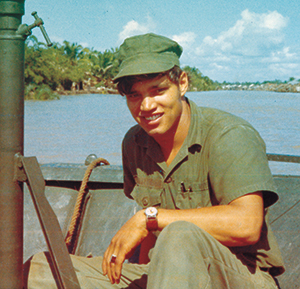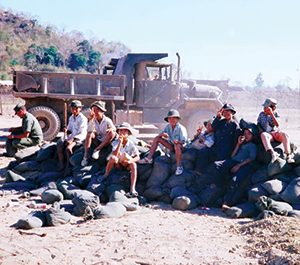

For six hours, Frank Harper rode his motorcycle in the tropical heat of the South Vietnamese countryside, trying to find someone who would recognize faces in a photo taken nearly four decades before.
His beat-up bike took him across rocky dirt roads, past tumbledown shacks and flooded rice paddies that spread across the valley floor below Ta Kou Mountain. This time, to an outsider, the landscape bore no visible signs of war—roads and bases he built nearly 40 years earlier as a Seabee, the Navy’s construction battalion, were long since dismantled.
“It looked so peaceful,” says Harper, thinking back, “removed from the violence.”
Of course, the lush scenery belied the human toll and the psychic remnants of the Vietnam War. One late October day in 1971, he flew out from Bien Hoa Air Base. From the runway, he watched Vietnamese women walk past a bunker. While he got to return home, they had to remain in a war-ravaged country. Children would suffer birth defects from 20 million gallons of Agent Orange dumped from the skies by American planes. Anyone known to help U.S. troops would be sent to re-education camps, sentenced to years of hard labor.
British photojournalist Philip Jones Griffiths once noted that the black granite Vietnam Veterans Memorial in Washington D.C., which is 150 yards long to fit 58,282 names of American soldiers, would extend for miles if it included those of the 1.8 million Vietnamese who died on both sides in the same war.”I asked myself, ‘What will they do?'” Harper says. “It was one of the saddest moments of my life. The months of dangerous and difficult work—would it be all for nothing?”
Harper came back to San Jose—he grew up on a small farm on the corner of White and Quimby roads—plagued by guilt and defeat. Like many Vietnam veterans facing indifference and hostility at home, he locked away his wartime experience. “I felt it was best just to be quiet about being a Vietnam veteran,” he says.
Seven years ago he returned to Vietnam to reconnect, compelled by the memory of the people—especially the children—he left behind. In his knapsack, he kept a stack of photographs to guide his journey. One of the images shot in 1971 showed eight Vietnamese boys perched on a stack of sandbags and surrounded by swirls of dust, some smiling and flashing the peace sign, another holding up a cigarette to his lips. They’re all around 7 to 8 years old in the photo. A soldier sits beyond them, near a military truck.
Harper wanted to find those boys. Find out what became of their lives. For many years he tried to forget the war. But he could never shake the memory of those children. They would flock to his military camp, befriend American soldiers and rifle through the trash for anything salvageable to bring back to their families. By now, they would be grandparents.
“I spent most of my life haunted by the war,” says Harper, now 64 and working on a documentary about retracing his attempts to reunite with the kids he photographed as a 21-year-old soldier. “I chose to black it out in my mind. But these photos pulled me back.”
After hours of riding on his rented motorcycle that summer day in 2007, Harper stopped by a roadside water stand, hot and dusty. A woman walked up behind him and tapped him on the shoulder. She heard he was looking for the boys in a photo. Neither could speak the other’s language, so she motioned toward the picture and guided him to follow her on her own motorcycle. They drove across narrow dusty roads, through a rice paddy and into a small hut. Her husband was one of the boys in that photo. Before long, Harper had reunited with six of those eight boys in the picture.
“One of the most memorable moments of my life,” Harper describes it. “To hear about their lives, their children and their families was incredibly healing.”


Generation Next
In 1943, Harper’s father, World War II veteran Oscar Harper, was shipped overseas to fight Axis troops in Italy. During a bombing raid that same year, he saved a small Italian boy, Tony, and his sister, who were hiding in a hole in the ground for shelter. Tony and his sister stayed for several months with U.S. troops, cared for by the Red Cross, and the boy volunteered as an interpreter. Before Harper returned Stateside after the war with a Purple Heart, he opened a bank account for Tony with his gambling winnings.
Oscar Harper is 96 years old now, gravely sick. He’s blind and still suffers shell shock—what we now know as Post Traumatic Stress Disorder—which makes talking about the war especially difficult. He was shot in the back. Fire from a flamethrower burned out his eyes. In a foxhole, a mortar hit the soldier beside him.
“He went through living hell in the war,” the younger Harper says. “But growing up, he would always bring up Tony. That was a bright spot in his memory. He always wondered what happened to him and his sister, wondered what became of their lives after the war. But now, it’s too late.”
Like his father, Harper gravitated toward helping children caught in the middle of war.
“They stand out,” he says. “They just want to live their lives and here they are, trapped in these situations beyond their control.”
Another Journey
In the years since his reunion with those boys in the photograph, Frank Harper has traveled to and from Vietnam several times. He raises money for orphanages in Hue and Saigon and a nonprofit that protects the primates on Ta Kou Mountain.
On Monday, he left for Vietnam once again, accompanied by 24-year-old Norwegian filmmaker Oscar Beckmann. They call their documentary-in-the-making “Retracing Footsteps.” Harper hopes to find those last two boys in the photo.
This time, Harper is bringing two Seabee buddies, Ken Hettler and Dan Bower, who worked alongside him 43 years ago, jackhammering and blasting rock for 15 hours a day to build a road up Ta Kou Mountain, which is also called Buddha Mountain for the chalk-white 49-meter reclining statue on its slopes.
Bower vividly remembers one of the boys in the photograph, Huong, and this trip offers him his first chance to return since being pulled out of Ta Kou in 1971. Bower made belts for the boys and would give them cigarettes for their dads or to sell. But he had to leave suddenly after his best friend died in combat, to escort the body back home. He never got to say goodbye to Huong. For 43 years, he’s held on to a pack of smokes he meant to give to him the day he left. Soon, they’ll reunite.
Huong, now in his 50s with six kids and grandchildren, will get to meet Bower for the first time since he left camp. Unlike Harper’s reunion with the boys in the photograph, this meeting will be caught on video. While some Vietnam veterans have a tough time coming to terms with their wartime experience—some refuse to even eat in a Vietnamese restaurant, Harper says—Bower wants to make peace with the past.
“I wish I could have filmed my own experience reconnecting with those families years ago,” Harper says. “This one, I want to share.”


